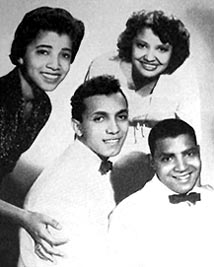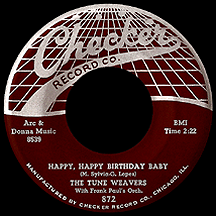THE TUNE WEAVERS
Happy, Happy Birthday Baby
While still in their teens, Gilbert Lopez and his sister Margo performed as a vocalese duo, setting their own unique singing style to jazz and big band instrumentals, and also performing straight vocal selections. In the early '50s, doing rhythm and blues or teen music hadn't occurred to the siblings. In 1956, after a few years of performing in Boston-area clubs, the act became a quartet with the addition of cousin Charlotte Davis and Johnny Sylvia (Margo's husband by that time). Tossing around ideas for what to call the outfit, they settled on The Tone Weavers, seemingly an odd name, yet appropriate considering the foursome's vocalese base.
A local record company owned by Frank Paul, Casa Grande, was the true definition of a small label, as Paul had only released five or six records since starting up four years earlier. He became interested in the group when he saw them perform a song Margo and Gilbert had written, "Happy, Happy Birthday Baby." Turns out they had been performing it for some time, usually getting good response from audiences. In March 1957 the group recorded the song at Boston's Ace Recording Studio along with a rhythmic version of the Jerome Kern-Oscar Hammerstein II standard from the 1927 musical Show Boat, "Ol' Man River," both backed by Paul's Orchestra. Margo was eight months' pregnant with her son Vinnie and her impassioned performance was perfecto; this in spite of Paul's insistence that they do more than 50 takes of the song!
The announcer at a show mispronounced the group's name, saying "Tune" instead of "Tone" and the goof became permanent; when the Casa Grande single came out it was credited to The Tune-Weavers. Paul promoted both sides and possibly had a preference for his cleverly-arranged "Ol' Man River," but it didn't really matter; radio stations just weren't showing interest in either side. The foursome continued playing clubs in the area until several months later, when the single unexpectedly started getting a lot of airplay in Philadelphia. American Bandstand had gone national on the ABC network in August '57 (after five years as a local Philly show) and host Dick Clark was enjoying his newfound power to break hit songs nationally. When the rising local hit was played on the show, it connected with teenagers and a sizeable segment of adult listeners, spreading quickly across America. Frank Paul, unable to handle the demand, sold the distribution rights to Chess Records. The powerhouse Chicago company released it on the Checker label and it hit the national charts in September. Within weeks, the Tune Weavers (the dash in their name taken out by Chess) found themselves opening for Roy Hamilton on a nationwide concert tour.

The record shot lightning-fast up the charts once the Checker single hit the stores, making it to the top ten by the end of the month, and for the remainder of the year the Tune Weavers were in hot demand. Unfortunately, Chess never treated the quartet as anything more than a one-hit fluke, impeding any chance they may have had at further success. They even changed the flip side of the record to Paul Gayten's instrumental "Yo Yo Walk" shortly after the song broke, resulting in less royalty money for the Tune Weavers...who actually derived very little income from the hit record anyway. Paul's feelings were similar to those of Chess and he sold his interest in the group to Herald Records. Chess put out "Ol' Man River" as the follow-up, then declined any further involvement when it failed to hit, while Herald released four singles on the Casa Grande label between 1958 and 1960 without success. The group continued together, though Charlotte quit and was replaced by Bill Morris after a year or so. In 1962, Chess gave the group one last shot with the Checker single "Your Skies of Blue," written by Fred Neil and featuring a more assertive vocal than usual by Margo, yet this one sank as all the other post-"Birthday" releases had done.
"Happy, Happy Birthday Baby," of course, has become a classic. Dodie Stevens reconfigured it as a seasonal entry, "Merry Merry Christmas Baby," in 1960. Country singers have developed a close connection to the bittersweet song over the years, starting with Dolly Parton, whose Ray Stevens-produced Monument release became her first record to hit the national pop charts in the fall of 1965, predating her unprecedented country career. '60s pop singer Sandy Posey transitioned to country in the early '70s and had a hit with the song in 1972. Ronnie Milsap's version made the most obvious impact, hitting number one on the country charts in 1986.
By this time Margo Sylvia had long been disenchanted with the music industry and what she termed the "unethical business practices" that had contributed to the group's minimal returns on their million-selling hit. She blamed Frank Paul more than any other for mismanaging them and began pursuing legal means in the 1980s in an attempt to receive fair compensation for all of the members of The Tune Weavers, particularly her brother Gilbert and herself for writers' royalties on the widely-reissued song they had created, so often remade in popular versions by others. At the time of Margo's death in 1991, those goals had yet to be realized.


